Fact-checking the economic claims Trump is likely to make in his State of the Union address
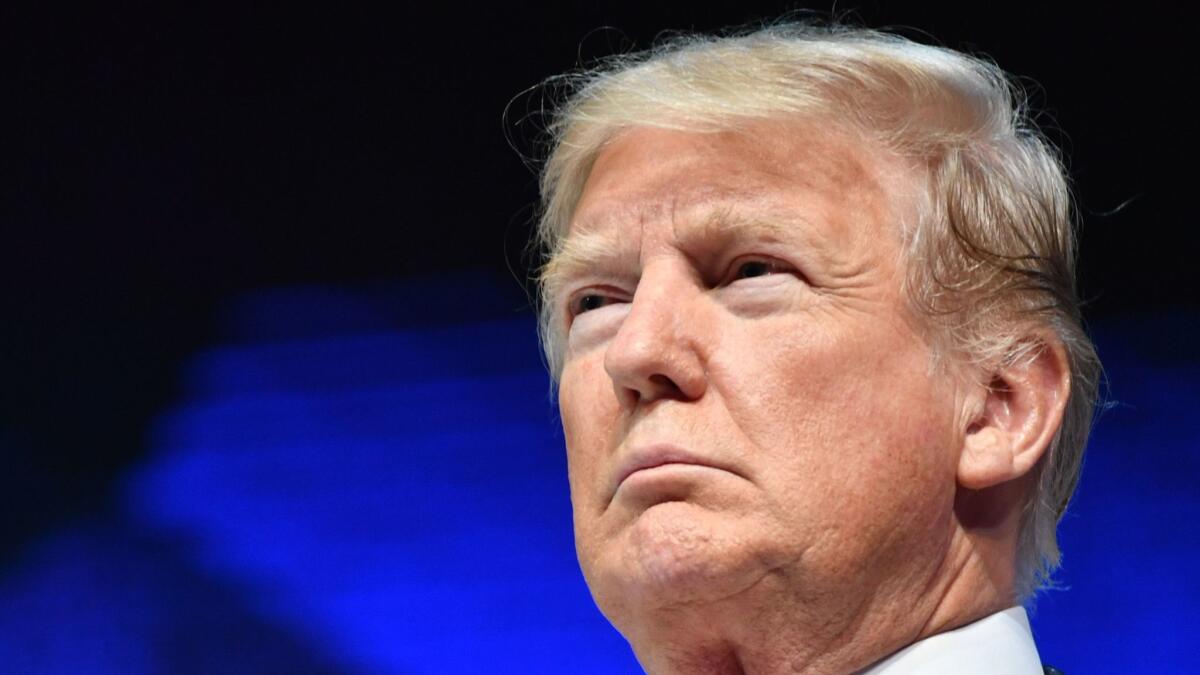
- Share via
Americans probably will hear a lot about the economy in President Trump’s State of the Union address Tuesday.
Among the main points Trump will make in the speech are taking credit for creating jobs and boosting the economy, according to a senior administration official who spoke on the condition of anonymity to give a preview of the president's remarks.
Here’s context for some of the comments he’s likely to make.
‘After years of stagnation, the United States is once again experiencing strong economic growth.’
Trump made that declaration in a speech Friday to global corporate and political leaders at the World Economic Forum in in Davos, Switzerland.
He followed that up on Sunday, when he tweeted: “Our economy is better than it has been in many decades.”
Both claims are overstatements.
While the economy grew at greater than a 3% annual rate from April through September, the pace slowed to 2.6% in the fourth quarter of last year, the Commerce Department reported on Friday.
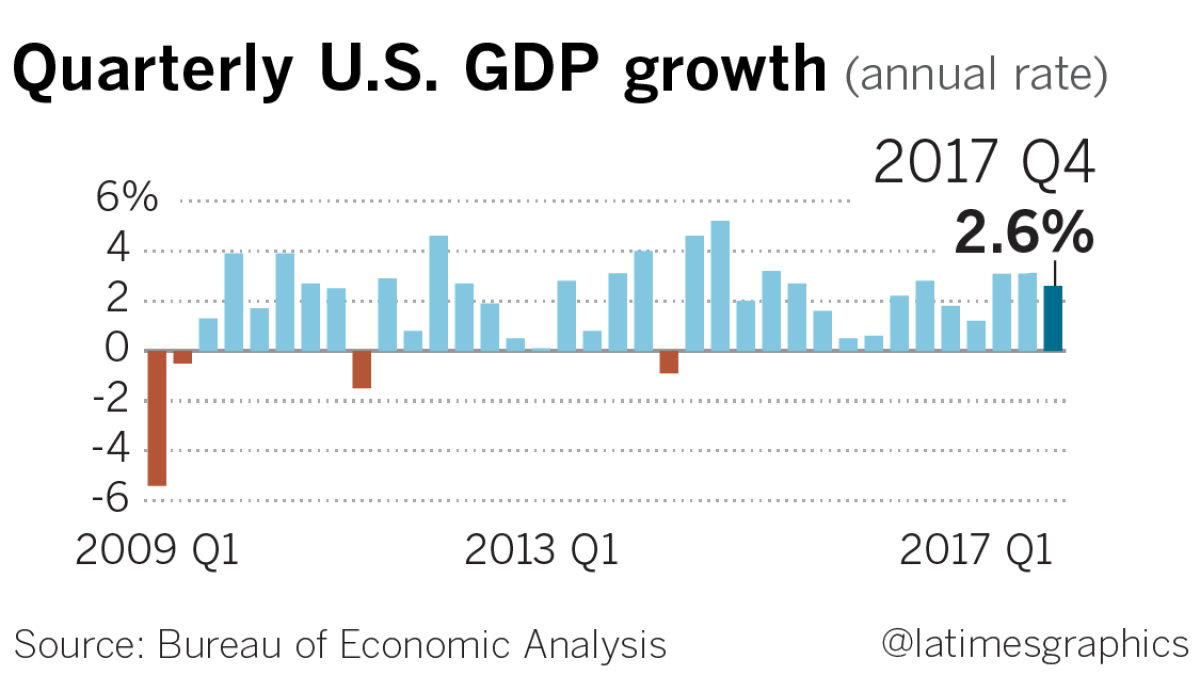
The new data, which will be revised in coming weeks, meant the initial estimate for economic growth for all of 2017 was 2.3%. That was a significant improvement over the previous year's 1.5% growth. But it was below the 2.9% recorded under former President Obama in 2015 and the 2.6% growth the year before that.
As for declaring the economy the best in many decades, growth topped 3% in 2004 and 2005. And the U.S. economy expanded at more than a 4% annual rate each year from 1997 to 2000.
At this point, the U.S. economy is growing at roughly the same pace it has for much of the recovery from the Great Recession. In the four years before Trump took office, the economy expanded at an average annual pace of 2.2%.
The tax cuts enacted by Congress last month are expected to boost growth this year, but not above 3%. The International Monetary Fund this week projected that the U.S. economy would expand 2.7% this year and 2.5% in 2019.
‘Since my election, we've created 2.4 million jobs, and that number is going up very, very substantially.’
Trump also made this statement in his Davos speech. And he’s correct on the number at least. Bureau of Labor Statistics data show that the economy added 2.37 million jobs from November 2016 through December 2017, the most recent data available.
But taking credit for job growth beginning with his election is a stretch, economists said. Although business and consumer confidence jumped after Trump’s election, it normally takes several months for a new administration’s policies to affect hiring decisions.
Trump did not take office until late January 2017. He said in a CNBC interview last week that the clock should not start on his economic growth record until the second quarter of last year. The first quarter, Trump said, was "the Obama quarter."
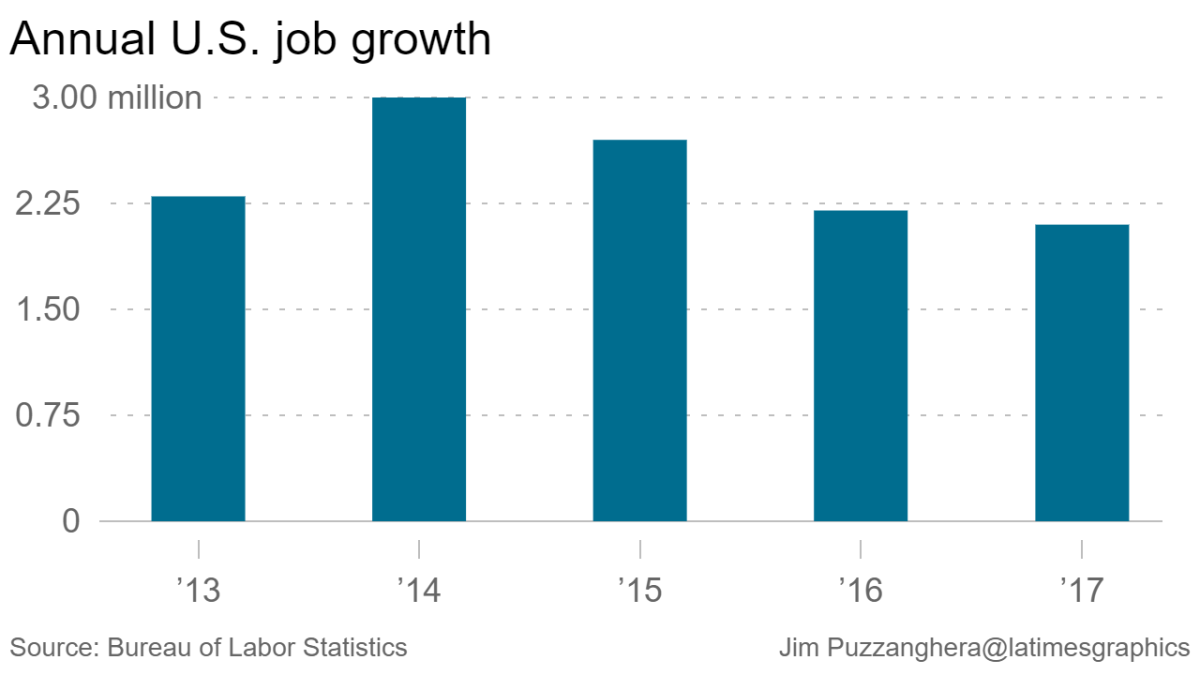
What’s more, while the economy added 2.06 net new jobs in 2017, that was down from 2.24 million in 2016 and well off the nearly 3 million jobs the U.S. economy added in 2014.
So job creation is substantial, but not as substantial as in recent years.
Trump also probably will note that the unemployment rate was 4.1% in December, the lowest since 2000. That also is true.
The rate declined 0.7 percentage point since Trump took office. That was an acceleration of a trend that began in 2009, when the rate hit 10%. It has declined steadily since then and economists don’t believe it can go down much further.
Federal Reserve officials estimate it will drop to 3.9% by the end of this year.
Black unemployment is at a record low
Trump has been touting the black unemployment rate since the Bureau of Labor Statistics reported last month that the figure dropped 0.4 percentage points in December to hit a new low of 6.8%.
But the drop requires some context and appears to have little, if anything, to do with Trump’s policies.
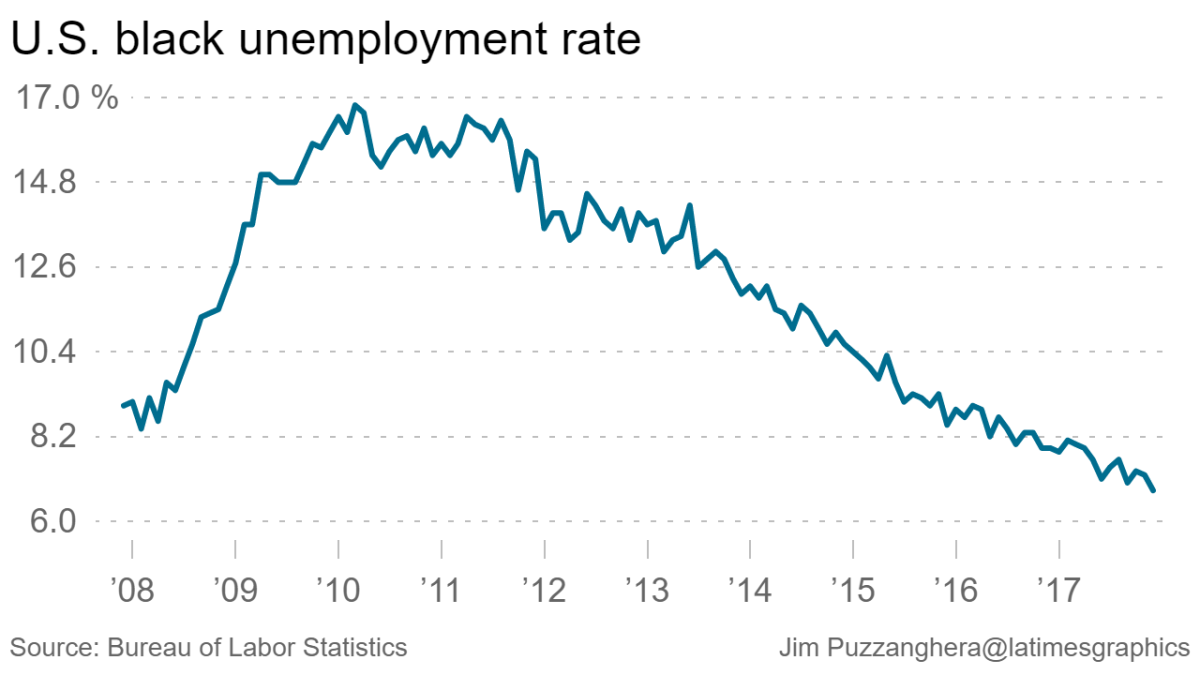
The BLS only has tracked black unemployment since 1972. And the recent sharp decline began in 2010 after the rate had peaked at 16.8%, the highest since 1984, in the aftermath of the Great Recession.
Trump has presided over a continuation of a trend in which the rate has declined about 1 percentage point a year. Another trend has also continued: The black unemployment rate remains about twice the rate for white Americans. That has been the case for decades.
‘The biggest tax cuts in the history of our country’
Trump made this declaration in the Davos speech and has repeated it often since Congress introduced legislation in the fall and passed it last month.
It’s a claim that appears to have little basis in fact.
The nonpartisan Committee for a Responsible Federal Budget estimated in October that the Trump tax cuts as a percentage of total economic output — also known as gross domestic product — would be the eighth largest since 1918.
And that came when the plan’s estimated size was larger than the final $1.5 trillion figure over 10 years.
When adjusting for inflation, the Trump tax cuts would be the fourth largest since 1940, the group said.
‘Millions of workers have received tax cut bonuses from their employers in amounts as large as $3,000’

As he did with the comment in the Davos speech, Trump has pointed often in recent weeks to announcements by companies that they were giving bonuses or raises to their employees because of the tax cuts.
Walt Disney Co., for example, announced last week it was giving $1,000 bonuses to 125,000 employees in a move it said was tied to the tax changes.
The conservative Americans for Tax Reform has kept a running list of such announcements. As of this week, the group said those commitments mean at least 3 million Americans will be receiving “special tax reform bonuses.”
In all, Americans for Tax Reform listed 274 companies that have announced bonus or other changes to benefit workers, including wage and salary increases or larger matching funds for 401(k) retirement plans.
A USA Today analysis of companies in the Standard & Poor’s 500 index estimated that more than 1.3 million workers would receive cash or stock-based bonuses totaling at least $1.7 billion in corporate announcements that cited the tax law.
Credit Suisse estimated the tax bill would save S&P 500 companies $75 billion to $100 billion in taxes in 2018 compared with the previous year, USA Today noted.
It’s unclear how much the tax law contributed to the bonuses and pay raises because companies already were facing the need to attract workers in a tight labor market.
Some analysts have suggested the announcements might be attempts to curry favor with the Trump administration and congressional Republicans.
For example, a spokesman for Wells Fargo & Co. said last month the bank’s move to raise its minimum pay to $15 an hour was part of a long-term plan and not related to the passage of the Republican tax overhaul.
The spokesman later backtracked and stated the hikes were a result of the bill's approval.
‘The stock market is smashing one record after another’
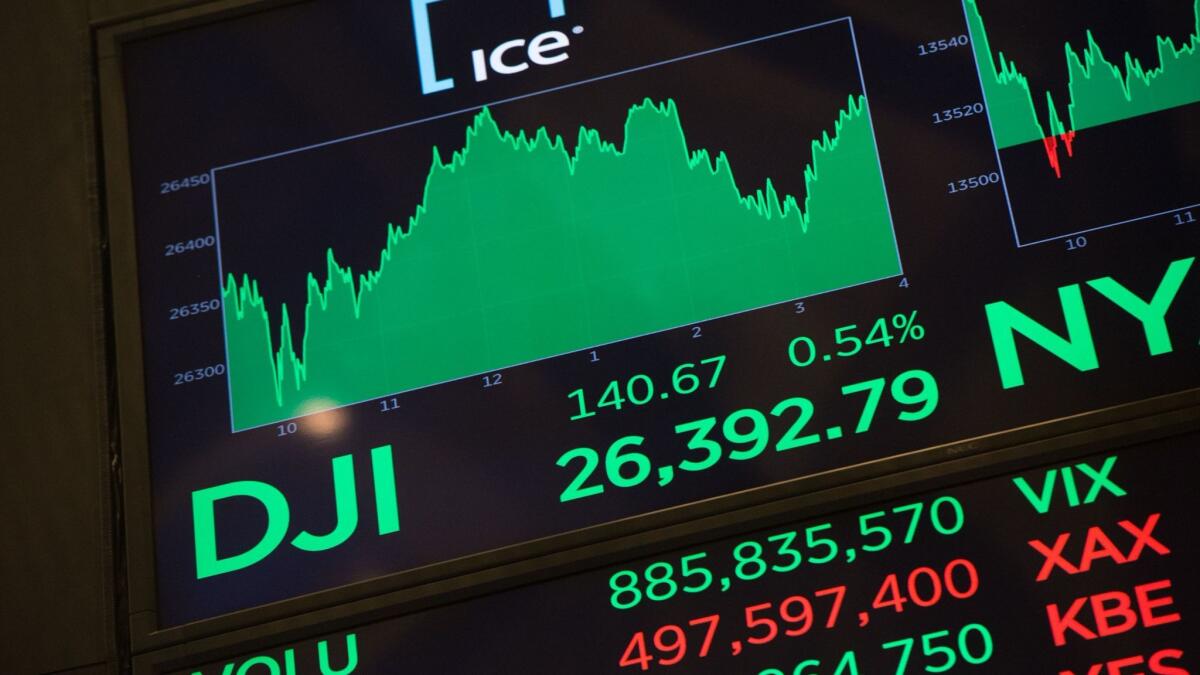
In his Davos speech, Trump pointed to a streak of record highs reached by the Dow Jones industrial average and other U.S. stock indexes since his election.
The Dow is up about 45% since election day in 2016 and about 34% since Trump took office a little more than a year ago.
The Dow’s gain in Trump’s first year in office was the second largest for any president, according to an analysis by Marketwatch. The Standard & Poor’s 500 index increased 24.1% in the same period, the fifth-best performance for a U.S. president’s first year in office.
Analysts said that Trump’s business-friendly policies, as well as the tax cut legislation, have helped boost a bull market that began in 2009.
Based on the Russell 3000, which represents about 98% of U.S. stocks, the stock market has added about $7 trillion in value since Trump was elected, according to CNBC.
Last fall, Trump suggested that gains in the stock market helped reduce the national debt.
"So you could say, in one sense, we're really increasing values. And maybe in a sense we're reducing debt,” he told Fox News in October.
But gains in the stock market do not reduce the federal government’s debt. And the Republican tax bill that Trump signed in December is forecast by nonpartisan congressional scorekeepers to add about $1.5 trillion to the national debt over the next 10 years.
Twitter: @JimPuzzanghera
Inside the business of entertainment
The Wide Shot brings you news, analysis and insights on everything from streaming wars to production — and what it all means for the future.
You may occasionally receive promotional content from the Los Angeles Times.








